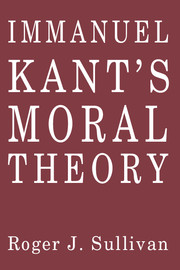Book contents
- Frontmatter
- Contents
- Preface
- Key to abbreviations and translators
- 1 Introduction
- 2 The context for Kant's moral philosophy
- Part I The nature of morality
- Part II The moral norm for persons
- Part III The norm for moral judgment
- Part IV Kant on history, politics, and religion
- Appendixes
- Notes
- Bibliography
- Index of names
- Index of subjects
1 - Introduction
Published online by Cambridge University Press: 05 June 2012
- Frontmatter
- Contents
- Preface
- Key to abbreviations and translators
- 1 Introduction
- 2 The context for Kant's moral philosophy
- Part I The nature of morality
- Part II The moral norm for persons
- Part III The norm for moral judgment
- Part IV Kant on history, politics, and religion
- Appendixes
- Notes
- Bibliography
- Index of names
- Index of subjects
Summary
Although I am absolutely convinced of many things that I shall never have the courage to say, I shall never say anything I do not believe.
Kant to Moses Mendelssohn, April 8, 1766Immanuel Kant's life
Immanuel Kant's life took place on two very different levels. To all appearances he lived the life of a quiet academician, avoiding even small changes in his routine. But this outer tranquillity was only the setting within which to do his inner, creative work, and there, above all else, Kant was a revolutionary philosophical polemicist, pitting his mind “against the great thinkers of the past, against his contemporaries, and against himself.” Kant developed a radically novel philosophical system of such enormous strength and importance that it has dominated the thinking of all who came after him. As was said originally of Plato: After Kant, philosophers argued for him or against him, but no one could philosophize any longer without taking him into account.
Kant was born in Königsberg, East Prussia (now Kaliningrad in the Soviet Union), on April 22, 1724, the fourth of nine children of a harnessmaker. He lived in or near that city all his life, and died there on February 12, 1804. After attending the University of Königsberg, he acted as a private tutor for families living nearby until he was appointed an instructor at the university.
- Type
- Chapter
- Information
- Immanuel Kant's Moral Theory , pp. 1 - 10Publisher: Cambridge University PressPrint publication year: 1989



